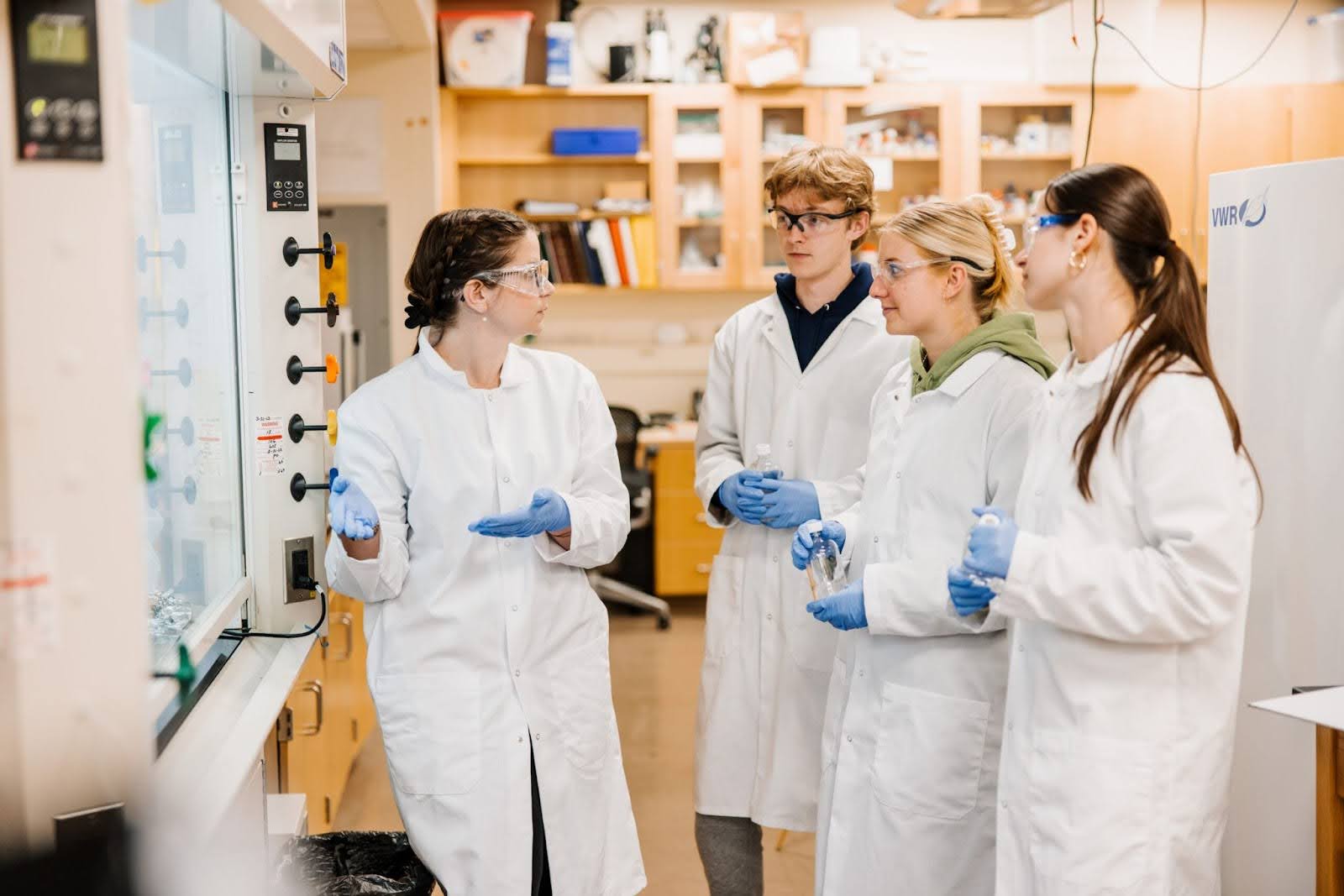Welcome to our comprehensive guide on AP Chemistry, a subject that often sparks a mix of curiosity and apprehension among high school students. As you embark on this academic journey, it's natural to wonder about the course's difficulty level and what it entails.
AP Chemistry is not just a class; it's an exploration into the world of molecules, reactions, and scientific principles that shape our daily lives. This guide aims to demystify the course, offering insights into what makes AP Chemistry challenging yet immensely rewarding. Whether you're a student weighing your options or a parent seeking to understand the course's rigors, you're in the right place.
Let's dive into the atomic world and discover just what AP Chemistry is all about.
Is AP Chemistry Hard?
The straightforward answer is: it depends. AP Chemistry's difficulty is subjective and largely depends on a student's background in science and their affinity for chemistry.
For those with a strong foundation in basic chemistry and a knack for analytical thinking, AP Chemistry can be a stimulating and manageable challenge. However, for students new to the rigor of AP courses or who find scientific concepts daunting, AP Chemistry may present a steeper learning curve.
What Does AP Chemistry Cover?
AP Chemistry delves deep into the world of atoms, molecules, and chemical reactions, offering a college-level curriculum in a high school setting. The course covers a broad spectrum of topics, including atomic structure, chemical bonding, thermodynamics, kinetics, and equilibrium.
Students also explore real-world applications like environmental chemistry, and the course emphasizes lab work, where theoretical knowledge is put into practice.
This comprehensive coverage ensures that students not only learn the fundamental principles of chemistry but also develop critical thinking and problem-solving skills that are valuable in any academic or career path.

What Makes AP Chemistry Challenging?
AP Chemistry is known for its demanding nature, and several factors contribute to its challenge:
-
Complex Concepts:
At the core of AP Chemistry's difficulty are the complex concepts it introduces. Students dive into intricate theories like molecular orbital theory, advanced thermodynamics, and chemical kinetics. These topics require a deep understanding and the ability to think abstractly, often pushing students beyond mere memorization to a more profound conceptual comprehension.
-
Math Dependency:
Math plays a significant role in AP Chemistry. From stoichiometry to thermodynamics, many chemistry problems involve calculations that require a strong grasp of algebra and sometimes calculus. This mathematical component can be a hurdle for students who are less confident in their math skills.
-
Fast-Paced Nature:
AP Chemistry covers a college-level curriculum within a limited high school schedule. This fast pace means that topics are often covered quickly, and students are expected to assimilate and apply new information rapidly. Time management and consistent study habits become crucial to keeping up with the coursework. -
Application Emphasis:
Unlike some subjects where theoretical knowledge might suffice, AP Chemistry places a heavy emphasis on the application of concepts. Laboratory work and practical problem-solving are integral parts of the curriculum, requiring students to apply what they've learned in real-world scenarios. This application-based approach, while beneficial for deep learning, adds an extra layer of complexity to the course.
How Difficult Is the AP Chemistry Exam?
The AP Chemistry exam is a formidable assessment, reflecting the course's comprehensive and challenging nature. The exam typically consists of multiple-choice questions and free-response sections, testing students' grasp of chemical concepts, their ability to solve complex problems, and their proficiency in applying theoretical knowledge to practical scenarios.
The difficulty of the exam can be quantified by its pass rate and average score. Historically, AP Chemistry has had a moderate pass rate compared to other AP subjects, with a significant portion of students scoring in the mid to high range.
This suggests that while the exam is challenging, it is certainly manageable with thorough preparation. One key aspect of the exam's difficulty is its breadth. It covers a wide array of topics, meaning students need a well-rounded understanding of the entire curriculum.
Additionally, the free-response section often requires a deeper level of thinking, where students must not only recall information but also apply it in novel contexts, which can be challenging under time constraints.
How Does AP Chemistry Compare to Other AP Courses?
AP Chemistry is often perceived as one of the more challenging AP courses, especially when compared to other science and humanities offerings. This perception stems from its heavy reliance on both complex theoretical concepts and mathematical applications.
Compared to AP Biology, which focuses more on memorization and understanding of processes, or AP Physics, which leans heavily on mathematical formulas and physical concepts, AP Chemistry strikes a unique balance that requires both rote learning and practical application.
In terms of workload, AP Chemistry is rigorous. It demands a significant investment of time both in and out of the classroom for laboratory work, problem sets, and studying.
This workload can be more intense than some humanities AP courses like AP History or AP English, where the focus is more on reading, writing, and analysis.
Is AP Chemistry Right for You?
Deciding whether AP Chemistry is right for you depends on several factors. It's an excellent choice if:
- You Have a Strong Science and Math Background: If you enjoy and excel in science, particularly chemistry, and have good mathematical skills, you'll likely find the course engaging and manageable.
- You're Pursuing a Science-Related Field: For students interested in majors like chemistry, biology, engineering, or pre-med, AP Chemistry is a vital stepping stone that provides a solid foundation for college-level coursework.
- You Enjoy Hands-On Learning: If you thrive in laboratory settings and like seeing how theoretical concepts apply in real-world situations, AP Chemistry's lab component will be particularly rewarding.
- You're Prepared for the Workload: Be ready for the commitment. AP Chemistry requires consistent study and a proactive approach to learning.
Ultimately, AP Chemistry is a challenging but rewarding course that suits students who are prepared for its rigor and interested in the sciences.

Frequently Asked Questions
Is AP Chemistry the Hardest AP?
While AP Chemistry is considered one of the more challenging AP courses, whether it's the "hardest" depends on individual strengths and preferences. It's known for its rigorous curriculum, which blends complex theoretical concepts with significant mathematical applications.
However, students with strong analytical skills and a passion for science often find it manageable. The perception of difficulty varies; for instance, students who excel in humanities may find AP Chemistry more challenging than their preferred subjects.
Is It Hard to Get an A in AP Chem?
Achieving an A in AP Chemistry requires dedication, consistent effort, and a solid understanding of both the theoretical and practical aspects of the subject. The course's challenging nature means that an A is hard-earned.
It demands regular study, active participation in labs, and a proactive approach to mastering complex concepts and problem-solving techniques. However, with the right strategies and work ethic, it is certainly attainable.
Is AP Chem Mostly Math?
While math is a significant component of AP Chemistry, the course is not "mostly math." It covers a wide range of topics, including atomic theory, chemical bonding, kinetics, and thermodynamics, which require both qualitative and quantitative analysis.
Mathematical skills are essential for calculations and interpreting data, but the course also demands a strong understanding of chemical principles and the ability to apply these concepts in various contexts, including labs.
Conclusion: Just How Difficult Is AP Chemistry?
In conclusion, AP Chemistry is undoubtedly challenging, but its difficulty is not insurmountable. It is a course that demands both a deep understanding of complex scientific concepts and the ability to apply mathematical principles effectively.
The challenge stems from the synthesis of theoretical knowledge with practical application, a fast-paced curriculum, and the analytical thinking required to grasp and apply chemical theories.
However, the course's rigor should not be a deterrent. Instead, it can be viewed as an opportunity for in-depth learning and skill development. Success in AP Chemistry comes down to a combination of factors: a strong foundation in science and math, a commitment to regular study and practice, and an enthusiasm for understanding the world at a molecular level.
Students who are willing to invest the time and effort, who are passionate about science, and who thrive in a challenging academic environment will likely find AP Chemistry rewarding.
It prepares students not only for college-level coursework in scientific fields but also instills critical thinking and problem-solving skills valuable in any discipline.
Ultimately, AP Chemistry is as difficult as you make it. With the right mindset, preparation, and support, it can be a profoundly enriching academic endeavor.
Looking for more information about AP Chemistry?
Download our comprehensive class guide by clicking the thumbnail below, or visit our AP Chemistry page to learn more about tutoring support.


